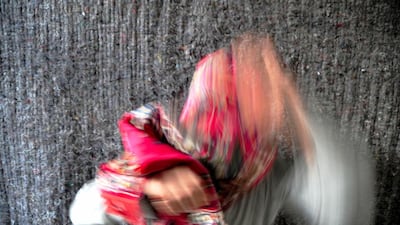No one can accuse Faisal Samra of sitting on the fence. The Saudi artist, whose work was banned in 1993 and who hasn’t shown any work in his native country since 2000, is returning home for a solo exhibition titled Majazz (Metaphor). But if you expected him to tread carefully, then you have the wrong man.
The centrepiece of Samra’s solo show, opening tonight at Ayyam Gallery in Jeddah, is an installation called Arab Spring. Floating green balloons bearing those words – printed in black Arabic script but weighed down into sand – will hover, quivering as the viewer is left to interpret their meaning. Talking to the artist, however, will set speculations aside.
“The Arab Spring is a joke,” Samra says. “It is a term created by the West, which they have inflated. But, like a balloon, it will pop. What we are experiencing is fake. I think the real revolution is still to come and it will affect the whole world.”
Alongside the balloons in the sand is a photographic work called Azazeel. Here, Samra has donned a crimson red mask, used extendable measuring rulers to mark out three apex points on the wall behind him and labelled them with the numbers 666. Impersonating the devil would be contentious in many societies but in Saudi, it is considered particularly brave.
“The curator and the gallery chose the work and I can’t guarantee the reaction,” Samra says. However, he does make sure to qualify that this is not a direct representation of the devil, but as the title of the exhibition suggests, merely a metaphor.
“I chose this because of the situation of the world now,” says Samra from Bahrain, where he lives. “The ghosts of war, killing and death are all around us and this gets to the heart of the matter. Every person has a devil and an angel in them and they always struggle with each other. My answer is to let us fight the devil with an angel.”
Majazz is the first exhibition that Ayyam Gallery has shown from a Saudi artist since it opened its doors in February earlier this year. It also signifies the growing momentum in the contemporary art scene in the Kingdom, which has started to flourish in the last couple of years.
“When I wanted to study art, we didn’t have the internet, we didn’t even have art books,” recalls Samra. “Of course, things are very different now.”
Samra went to study at the École Nationale Supérieure des Beaux-Arts in Paris in the 1970s and returned for a few exhibitions in Saudi Arabia, including one at Rochan Gallery in Jeddah in 1985 in which three-dimensional paintings of Saudi men and women without faces and wearing the traditional dress but in different colours, earned him the title of the Father of Conceptualism in Saudi Arabia.
“From the beginning, I was trying to break with convention,” he says. “This was a big statement and the show was sold out. It was clear that even then, people were looking for something different.”
Although a later show in 1993 was censored, the 2000 show, featuring a series of wire mesh heads was a success, and was sponsored by the Al Mansouria Foundation.
“But even for myself, I struggled,” admits Samra. “I lost a lot of energy to find the right windows.
“I feel a kind of disappointment because when you see the talent in Saudi and the things that are going on there and think about if there was the freedom of expression plus the right platforms, then we would be completely somewhere else by now.”
But, with his return, as well as other stirrings in the country such as Edge of Arabia’s We Need to Talk (which was hosted in an unfurnished wing of a Jeddah mall in 2012) and Soft Power (an all-female exhibition hosted in the new Alaan Artspace in Riyadh), there is significant change looming on the horizon.
“Since I was a baby, my mother told me I had to look at what’s inside. And I believe that artistic expression is part of my behaviour. So for me, the art was inside and pushing, like a kind of disease that had to come out somehow.
“But now, finally, there are more platforms to provoke and inspire others to also express themselves.”
• Majazz runs until October 31 in Ayyam Gallery, Jeddah in Bougainvillea Centre in the Al Shati district
aseaman@thenational.ae

